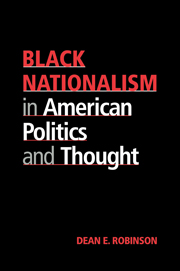Book contents
- Frontmatter
- Contents
- Acknowledgments
- Introduction
- 1 Anglo-African Nationalism
- 2 Malcolm X and the Nation of Islam
- 3 Black Nationalist Organizations in the Civil Rights Era
- 4 Black Nationalist Discourse
- 5 Black Nationalism as Ethnic Pluralism
- 6 Black Nationalism and the Ethnic Paradigm
- 7 Black Nationalism in the Contemporary Era
- Notes
- Selected Bibliography
- Index
5 - Black Nationalism as Ethnic Pluralism
Published online by Cambridge University Press: 12 January 2010
- Frontmatter
- Contents
- Acknowledgments
- Introduction
- 1 Anglo-African Nationalism
- 2 Malcolm X and the Nation of Islam
- 3 Black Nationalist Organizations in the Civil Rights Era
- 4 Black Nationalist Discourse
- 5 Black Nationalism as Ethnic Pluralism
- 6 Black Nationalism and the Ethnic Paradigm
- 7 Black Nationalism in the Contemporary Era
- Notes
- Selected Bibliography
- Index
Summary
Although Third World nationalist politics could inspire black nationalist theory and strategy in the United States, it could not alter the fact that, from the early 1960s to the early 1970s, black nationalists confronted challenges and obstacles born on American soil. Ultimately, black nationalists had to square off against those who held power in the United States. This is not to say that certain political questions were not relevant to both Africans and blacks in the United States. It is to say, as Harold Cruse noted at the time, that nationalists here faced uniquely American – not Algerian, or Kenyan – conditions, shaped again by local political terrain.
Of course, at the time, many people failed to note this important historical truth: that black politics – even black nationalist politics – tends to draw upon intellectual and political currents in American society and build upon them to advance the cause of Afro-Americans. The reason is simple: from early in the history of the United States, Afro-Americans have been embedded in the same matrices of thought, culture, society, and politics as white Americans.
Modern black nationalism did not differ from earlier forms of black nationalism in this respect. Where classical or Anglo-African nationalism pursued emigration and commerce, modern black nationalists initiated political and economic projects homologous to those of their own period. Leaving aside revolutionary groups that sought to topple capitalism, most of what passed as black nationalism/Black Power during the 1960s (especially by the mid-1960s) looked much like black efforts to do what other “ethnic” groups had done: to pursue their interests in a pluralistic political system, subsumed by a capitalistic economic one.
Information
- Type
- Chapter
- Information
- Black Nationalism in American Politics and Thought , pp. 88 - 103Publisher: Cambridge University PressPrint publication year: 2001
